人教版七年级下册第十二单元知识点
人教版七年级英语下册第十二单元教案

Unit 12 What did you do last weekend?Section A (1a-2d)一、教学目标:1. 语言知识目标:1)掌握以下单词:camp, lake, beach, badminton, sheep, as, natural, butterfly, visitor, tired, stay, stay up late.能掌握以下句型:①—Where did you do last weekend, Lucy?—I went to summer camp.②—How was your weekend?—Pretty good, thanks③—I worked as a guide at the Natural History Museum.④—How interesting!2) 能了解以下语法:learn to talk about recent past events.2. 情感态度价值观目标1.帮助学生树立合作学习观点。
2.讲述美好的周末,树立学生享受生活,热爱美好的大自然情感。
二、教学重难点1. 教学重点:1) Key vocabulary.2) Talk about recent past events2. 教学难点:1) Talk about recent past events2) Practice students’listening, speaking, reading and writing skills.三、教学过程Ⅰ. Warming-up and revisionPoint to the previous Saturday and Sunday on a wall calendar and say, Saturday and Sunday are the weekend. This is last weekend. Then tell some things you did last weekend such as,/ cleaned my house over the weekend. Use quick sketches (in the board along with gestures to demonstrate the meaning of each activity,Ⅱ. 1 a This activity introduces the key vocabulary.Focus attention on the picture. Ask students to tell what they see. Name each activity and ask students to repeat: did my homework, went to the cinema, went boating, camped by the lake, went to the beach, played badminton.Point out the numbered list of activities. Say each one again and ask students to repeat.Then ask students to match each activity with one of the pictures. Say, Write the letter of each activity next to the words. Point out the sample answer.Check the answers.Ⅲ. ListeningWork on 1bThis activity gives students practice in understanding the target language in spoken conversation. Point to the activities in the picture in activity la. Ask students to tell what the person did in each picture. For example, She played badminton, or Lucy went to the cinema. Play the recording the first time. Students only listen.Play the recording a second time. This time say. Listen to the recording and write the days and times Lucy did each thing under the pictures. Point out the sample answer under the picture of Lucy playing badminton; on Saturday morning.Correct the answers.Ⅳ. PairworkWork on 1cThis activity provides guided oral practice using the target language.Point to the example conversation. Ask two students to read the dialogue to the class.Say, Now work with a partner. Student A, pretend to be Lucy. Student B, ask questions about what Lucy did on different days and times over the weekend. Talk about the activities in the picture.Students work in pairs. As they talk, move around the room monitoring their work. Offer language or pronunciation support as needed,Ⅴ. ListeningWork on 2a:This activity gives students practice in understanding the key vocabulary in spoken conversation.Point to the five sentences and ask a student to read these sentences to the class.Say, You will hear recording of a conversation. The people will talk about some of the activities and people, but they will not talk about others. Please underline the words you hear on the recording.Play the recording the first time. Students only listen.Play the recording a second time. This time, ask students to underline each word that is said on the tape. Point out the sample answer, grandmother.Correct the answers.1grandma 2 homework 3 English 4 farm 5 cowsⅥ. ListeningWork on 2b:This activity provides listening practice using the target language.Call attention to the pictures of Carol, Becky, and Jack and ask students to identify each person by name.Say, Now I will play the recording again. Listen to the students talking about what they did over the weekend. Write C for Carol, B for B Becky or J for Jack next to each statement in activity 2a. The first one has been done for you.Play the recording the first time. Students only listen.Point out the sample answer, S, in statement 1. Say, Sonia visited her grandmother.Play the recording again. Ask students to write a letter in front of each statement to show what each person did.Check the answers. B B C J JⅦ. Pair workAsk and answer in pairs.Point to the example conversation. Ask two students to read the dialogue to the class.Say, Now work with a partner. Student A, ask questions about what, who or where , Student B answers. Students work in pairs.Ⅷ. Role-play the conversation.1. Ask Ss to look at conversation in 2d. Then Ss read the dialogue by themselves and find the answer tothese questions:①What did Lisa do on her weekend?②What did Paul do on his weekend?2. Ss work in pairs and role-play the conversations.3. Have several pairs perform their conversations for the rest of the class.Homework:1. Copy new words twice.2. Write about what you did last weekend. 板书设计:Section A (Grammar Focus-3c)一、教学目标:1. 语言知识目标:1) 掌握以下单词:away, mouse, baby, shout ,shout at, woof, language.2) 继续练习一般过去时态能掌握以下句型:—What did you do last weekend?—I did my homework.—Who visited her grandma?—Becky did.—Where did she go last weekend? —She went to a farm.—Who did she go with?—She went with her classmates. 2. 情感态度价值观目标:1. 提高学生独立学习能力。
人教版七年级下册道德与法治全册知识点总结
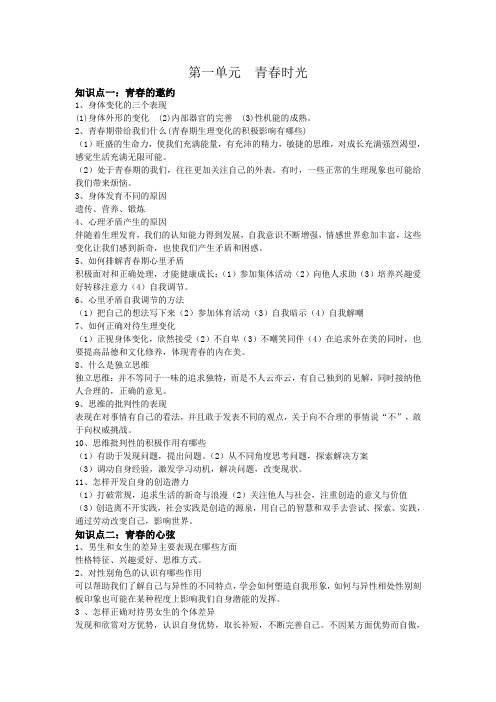
第一单元青春时光知识点一:青春的邀约1、身体变化的三个表现(1)身体外形的变化 (2)内部器官的完善 (3)性机能的成熟。
2、青春期带给我们什么(青春期生理变化的积极影响有哪些)(1)旺盛的生命力,使我们充满能量,有充沛的精力,敏捷的思维,对成长充满强烈渴望,感觉生活充满无限可能。
(2)处于青春期的我们,往往更加关注自己的外表。
有时,一些正常的生理现象也可能给我们带来烦恼。
3、身体发育不同的原因遗传、营养、锻炼4、心理矛盾产生的原因伴随着生理发育,我们的认知能力得到发展,自我意识不断增强,情感世界愈加丰富,这些变化让我们感到新奇,也使我们产生矛盾和困惑。
5、如何排解青春期心里矛盾积极面对和正确处理,才能健康成长:(1)参加集体活动(2)向他人求助(3)培养兴趣爱好转移注意力(4)自我调节。
6、心里矛盾自我调节的方法(1)把自己的想法写下来(2)参加体育活动(3)自我暗示(4)自我解嘲7、如何正确对待生理变化(1)正视身体变化,欣然接受(2)不自卑(3)不嘲笑同伴(4)在追求外在美的同时,也要提高品德和文化修养,体现青春的内在美。
8、什么是独立思维独立思维:并不等同于一味的追求独特,而是不人云亦云,有自己独到的见解,同时接纳他人合理的,正确的意见。
9、思维的批判性的表现表现在对事情有自己的看法,并且敢于发表不同的观点,关于向不合理的事情说“不”,敢于向权威挑战。
10、思维批判性的积极作用有哪些(1)有助于发现问题,提出问题。
(2)从不同角度思考问题,探索解决方案(3)调动自身经验,激发学习动机,解决问题,改变现状。
11、怎样开发自身的创造潜力(1)打破常规,追求生活的新奇与浪漫(2)关注他人与社会,注重创造的意义与价值(3)创造离不开实践,社会实践是创造的源泉,用自己的智慧和双手去尝试、探索、实践,通过劳动改变自己,影响世界。
知识点二:青春的心弦1、男生和女生的差异主要表现在哪些方面性格特征、兴趣爱好、思维方式。
人教版七年级英语下册十二单元知识点汇总总结
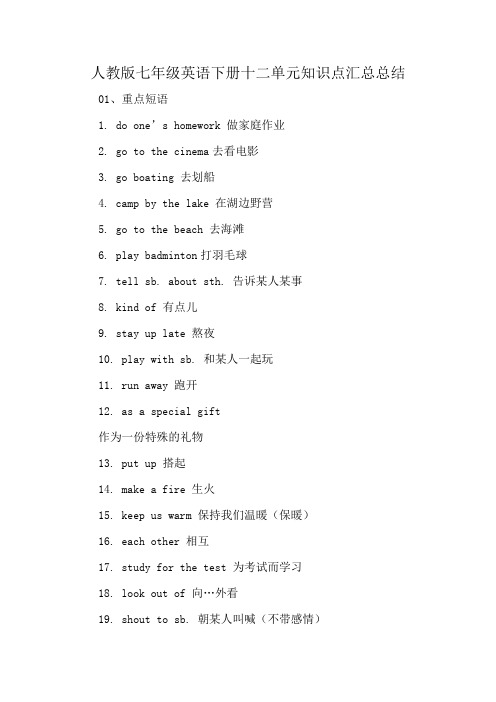
人教版七年级英语下册十二单元知识点汇总总结01、重点短语1. do one’s homework 做家庭作业2. go to the cinema去看电影3. go boating 去划船4. camp by the lake 在湖边野营5. go to the beach 去海滩6. play badminton打羽毛球7. tell sb. about sth. 告诉某人某事8. kind of 有点儿9. stay up late 熬夜10. play with sb. 和某人一起玩11. run away 跑开12. as a special gift作为一份特殊的礼物13. put up 搭起14. make a fire 生火15. keep us warm 保持我们温暖(保暖)16. each other 相互17. study for the test 为考试而学习18. look out of 向…外看19. shout to sb. 朝某人叫喊(不带感情)20. shout at sb. 朝某人叫喊(带感情)21. jump up and down 跳上跳下22. a second language 第二语言23. finish high school中学毕业24. get a surprise 吃惊25. work as a guide 做导游工作26. wake sb. up 弄醒某人02、重点句子Grammar Focus 句子1.What did you do last weekend?你上周末做了什么事情?2. I did my homework. / We went boating. 我做了家庭作业。
/ 我们去划船了。
3. Who visited her grandma?Becky did.谁去看望了她的奶奶?Becky去了。
4. Where did she go last weekend?她上周末去了哪里?5. She went to a farm.她去了一个农场。
1-12单元七年级下册重点短语人教版

第一单元(重点短语)1.弹吉他2.拉小提琴3.打鼓4.弹钢琴5.下棋6.打篮球7.踢足球8.打网球/排球9.说英语10.讲汉语11.想要做某事12.参加……俱乐部/兴趣小组13.喜欢做某事14.擅长做…精通…15.讲故事16.听起来不错17.让某人做某事18.校园文艺演出招募学生学员19.你会做什么20.和某人交谈21.谈论某事22.放学后23.课后,课余时间24.在音乐室里25.使(中国)功夫,表演(中国)功夫26.来展示给我们看看27.和某人一起做游戏28.为老人提供帮助29.招聘音乐教师(广告语)30.用英语在运动方面为人们提供帮助31.忙碌32.有空33.讲英语的学生34.需要某人做某事35.帮助某人做某事36.给某人拨打电话37.在老人的家里38.善于和某人相处39.告诉某人某事40.(和某人)结交朋友41.在周末42.教某人某事43.参加我们的校园音乐节44.辅导数学1.几点钟2.去上学3.去工作4.起床(晚)5.穿衣服6.刷牙7.吃早饭8.洗淋浴9.在大约六点半10.11点整11.一份有趣的工作12.在广播电台13.从…到…14.在晚上15.那个时间吃早饭真逗16.迟到17.我上班从不迟到18.在周末19.在上学的日子里,在平时20.在早上/下午/晚上21.三点一刻22.六点四十五23.做作业 24.回家25.散步,走一走26.上床睡觉(早)27.吃的快(副词修饰动词)28.做运动,锻炼29.招聘音乐教师(广告语)30.有时我打半个小时篮球(for+时间段)31.到达32.到家/到那儿33.要么…要么;或者…或者…34.看电视35.玩计算机游戏36.吃丰盛的早餐37.许多…38.对…有益处39. 对…有害处40.味道好极了41.为某人制作某东西42.为我做早饭43……声音44.有一个健康的生活方式45.给你衣服(倒装句)晚上我要么看电视,要么玩游戏为了拥有一口好牙齿,吃完东西之后你需要刷牙从周一到周五我没有时间打扫房间(不定时短语作定语)1.到校2.乘火车/公共汽车/地铁去……3.骑自行车去……4.不行上学……5.每天6.每个上学日7.多远8.多长(时间或距离)9.我不是很肯定/我把我不大10.公交车旅程11.做某事花费某人多长时间12.乘……13.它是一种很好的锻炼14.玩得高兴,过得愉快15.在学校16.开车去上班17.它距离学校大约五公里远18.公交停靠点19.汽车站20.火车站21.地铁站23.认为;想起;考虑23.你觉得……怎么样24.横穿河流去学校25.在中国的一个小乡村26.在……和……之间27.在一根钢索上28.一个十一岁大的孩子29.害怕……30.害怕做某事 31.喜爱做某事32.和…一起玩33……中的许多34.离开乡村35.离家/毕业36.实现37.村民们的梦想38. 为什么不?39.不得不40.谢谢41.到那儿42.和某人交谈43.我的最后一个问题44.一年一两次对许多学生来讲到达学校很容易河水流动很急,船只无法通过1.在课堂上2.校规;校园规章制度3.图书馆制度4.上课迟到5.必须守时6.在/走廊/教室/餐厅里7.在户外听音乐8.在音乐室里;在歌厅里9.戴帽子10.穿校服11.和某人打架12.……中的一些13. ……中的一个14.把……带到……15.不得不16.我明白了。
2014年新人教版七年级下册第一二三四至十二单元基础知识精讲
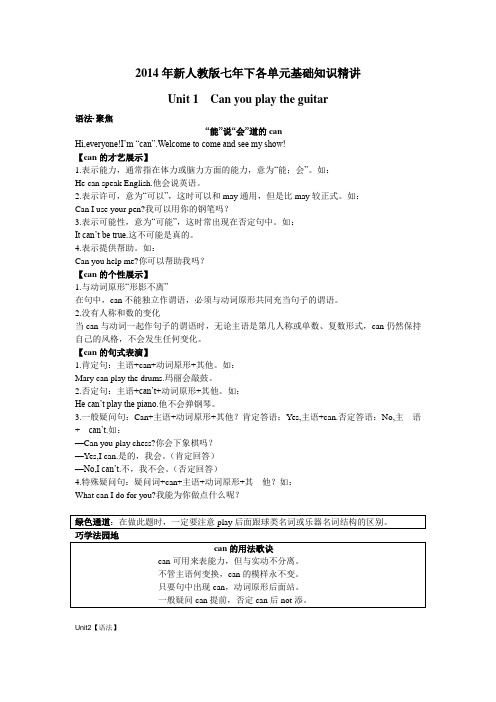
2014年新人教版七年下各单元基础知识精讲Unit 1Can you play the guitar语法·聚焦“能”说“会”道的【can的才艺展示】1.表示能力,通常指在体力或脑力方面的能力,意为“能;会”。
如:He can speak English.他会说英语。
2.表示许可,意为“可以”,这时可以和may通用,但是比may较正式。
如:Can I use your pen?我可以用你的钢笔吗?3.表示可能性,意为“可能”,这时常出现在否定句中。
如:It can’t be true.这不可能是真的。
4.表示提供帮助。
如:Can you help me?你可以帮助我吗?【can的个性展示】1.与动词原形“形影不离在句中,can不能独立作谓语,必须与动词原形共同充当句子的谓语。
2.没有人称和数的变化当can与动词一起作句子的谓语时,无论主语是第几人称或单数、复数形式,can仍然保持自己的风格,不会发生任何变化。
【can的句式表演】1.肯定句:主语+can+动词原形+其他。
如:Mary can play the drums.玛丽会敲鼓。
2.否定句:主语+can’t+动词原形+其他。
如:He can’t play the piano.他不会弹钢琴。
3.一般疑问句:Can+主语+动词原形+其他?肯定答语:Yes,主语+can.否定答语:No,主语如:—Can you play chess?你会下象棋吗?—Yes,I can.是的,我会。
(肯定回答)—No,I can’t.不,我不会。
(否定回答)4.特殊疑问句:疑问词+can+主语+动词原形+其他?如:What can I do for you?我能为你做点什么呢?绿色通道:在做此题时,一定要注意play后面跟球类名词或乐器名词结构的区别。
巧学法园地can的用法歌诀can可用来表能力,但与实动不分离。
不管主语何变换,can的模样永不变。
只要句中出现can,动词原形后面站。
人教版七年级英语下册单元知识点总结(全册)
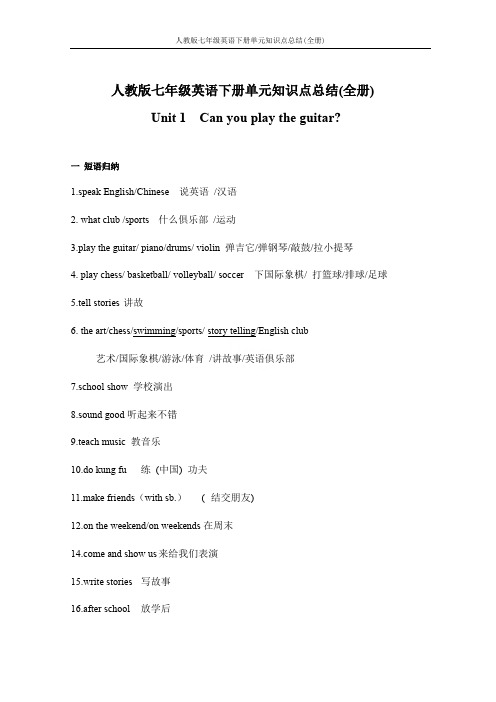
人教版七年级英语下册单元知识点总结(全册)Unit 1 Can you play the guitar?一短语归纳1.speak English/Chinese 说英语/汉语2. what club /sports什么俱乐部/运动3.play the guitar/ piano/drums/ violin 弹吉它/弹钢琴/敲鼓/拉小提琴4. play chess/ basketball/ volleyball/ soccer 下国际象棋/ 打篮球/排球/足球5.tell stories讲故6. the art/chess/swimming/sports/ story telling/English club艺术/国际象棋/游泳/体育/讲故事/英语俱乐部7.school show 学校演出8.sound good听起来不错9.teach music 教音乐10.do kung fu练(中国) 功夫11.make friends(with sb.)(结交朋友)12.on the weekend/on weekends在周末e and show us来给我们表演15.write stories写故事16.after school放学后17.English-speaking students说英语的学生18.play games 做游戏19.the Students’ Sports Center学生运动中心20.at the old people’s home在老人之家21.be in our school music festival 参加学校音乐节22.jion the music club加入音乐俱乐部二用法集萃1. play +棋类/球类下……棋,打……球2. play the +乐器弹/拉……乐器3. be good at doing sth.擅长做某事be good for.. 对… 有好处be good /kind to … 对… 友好4. be good with sb. 和某人相处地好; 善于应付(处理)…5. need(sb./sth.)to do… 需要(某人/某物)做….6. can + 动词原形能/会做某事7. a little + 不可数名词: 一点儿……9. like to do sth.或like doing sth. 喜欢做某事10.want to do…想做……11.What about…?…怎么样?(后面接Ving/代词/名词)12. talk用法: talk to/with sb. 跟某人说话talk about sth. 谈论某事tell 用法:tell sb sth. 告诉某人某事tell sb to do sth 告诉某人去做某事tell stories 讲故事say用法:say直接加说话的内容/itspeak用法:speak +语言13.help sb. with sth在某方面帮助某人= help sb.(to)do sth14.be free /busy有空/很忙15. call sb. at+号码拨打某人的……号码16. be in=join …成为…中的一员(P6)17.want …for the school show为学校表演招聘……三典句必背1. Can you draw? 你会画画吗?Yes, I can. / No, I can’t.是,我会。
人教版七年级英语下册Unit12SectionA单元语法聚焦十二

单元语法聚焦十二
3. He found the key in his drawer.(对画线部分提问) ___W__he_r_e_ ____d_id___ he ___f_in_d___ the key? 4. She did her homework at school.(改为否定句) She ___d_i_d_n_'t_ ____d_o___ her homework at school. 5. They visited other countries during the holiday.(改为一般疑问句) ____D_i_d__ they ___v_is_it___ other countries during the holiday?
单元语法聚焦十二
( B )5.2016·绵阳—Don't you see the sign “No parking!” on the right? —Sorry, I ________. But now I know parking here is not right. A.don't B.didn't C.hadn't D.doesn't
单元语法聚焦十二
(3)一般疑问句:___D_id____+主语+__动_词__原__形_+其他?肯定回答: Yes, __主_语_____+___d_i_d___.否定回答:No, __主__语____+__d_id_n_'_t __. —Did he go to Guangzhou yesterday? 昨天他去广州了吗? —Yes, he did./No, he didn't.是的,他去了。/不,他没去。 (4)特殊疑问句:特__殊__疑_问__词_+___d_i_d___+主语+_动__词_原__形__+其他? What time did he get to school this morning? 今天上午他是什么时间到学校的?
人教版七年级英语下册第十二单元知识点归纳
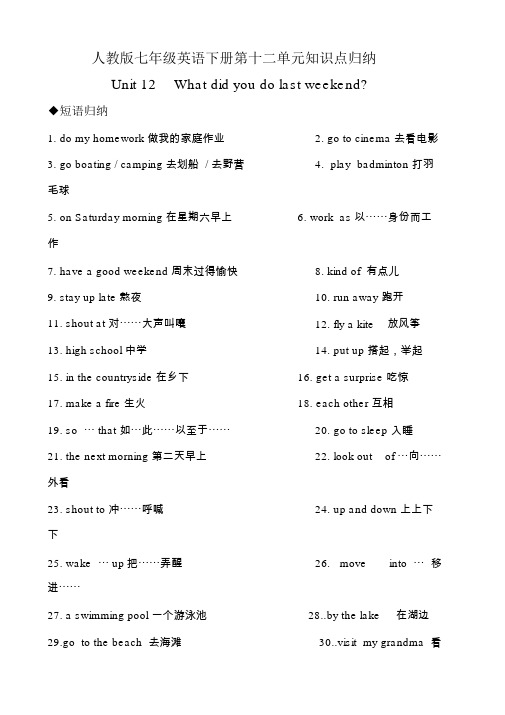
人教版七年级英语下册第十二单元知识点归纳Unit 12What did you do last weekend?◆短语归纳1. do my homework 做我的家庭作业2. go to cinema 去看电影3. go boating / camping 去划船 / 去野营4. play badminton 打羽毛球5. on Saturday morning 在星期六早上6. work as 以⋯⋯身份而工作7. have a good weekend 周末过得愉快8. kind of 有点儿9. stay up late 熬夜10. run away 跑开11. shout at 对⋯⋯大声叫嚷12. fly a kite放风筝13. high school 中学14. put up 搭起,举起15. in the countryside 在乡下16. get a surprise 吃惊17. make a fire 生火18. each other 互相19. so ⋯ that 如⋯此⋯⋯以至于⋯⋯20. go to sleep 入睡21. the next morning 第二天早上22. look out of ⋯向⋯⋯外看23. shout to 冲⋯⋯呼喊24. up and down 上上下下25. wake ⋯ up把⋯⋯弄醒26. move into ⋯移进⋯⋯27. a swimming pool 一个游泳池28..by the lake在湖边29.go to the beach 去海滩30..visit my grandma 看望我奶奶31..study for the English test为英语测验而学习备考32.the Natural History Museum自然历史博物馆33. high school高中 ,中学34. .tell stories讲故事35..give back归还36..be afraid害怕37..play the guitar弹吉他38.go to the library去图书馆◆用法集萃1.go + doing 去做某事2.play + 球类玩⋯⋯球3.时间段 + ago ⋯⋯前4.keep + sb. / sth. + 形容词 / 副词 / 介词短语使⋯⋯保持⋯⋯5. so + 形容词 / 副词 + that 句子如此⋯⋯以至于⋯⋯6.see sb. doing sth.看见某人正在做某事7.let sb. do sth. 让某人做某事8. start to do / doing sth. 开始做某事◆典句必背1. —What did you do last weekend? 上个周末你做什么了?I did my homework. / We went boating. 我做了我的家庭作业。
人教版七年级下册英语各单元知识点归纳

人教版七年级下册英语各单元知识点归纳人教版七年级下册英语各单元知识点归纳Uni t 1 Can you pl ay the gui tar?短语归纳1 . pl ay chess 下国际象棋2. pl ay the guitar 弹吉他3. speakEngl ish 说英语4. Engl i sh cl ub 英语俱乐部5. tal k to 跟…说6. pl ay thevi ol in 拉小提琴7. pl ay the pi ano 弹钢琴8. pl ay the drums 敲鼓1 0. do kung fu 练 (中国) 功夫1 1 . tel l stori es 讲故事1 2. pl ay games做游戏用法集萃1. play +棋类/球类下……棋,打……球2. play the +西洋乐器弹/拉……乐器3. be good at doing sth.= do well in doing sth. 擅长做某事4. be good with sb.和某人相处地好5. need sb. to do sth. 需要某人做某事6. can + 动词原形能/会做某事7. a little + 不可数名词一点儿……8. join the …club 参加…俱乐部Uni t 2 What ti me do you go to school ?短语归纳1 . what time 几点2. go to school 去上学3. getup 起床4. take a shower 洗淋浴5. brush teeth 刷牙6. getto 到达7. do homework 做家庭作业8. go to work 去上班9. go home 回家1 0. eat breakfast 吃早饭1 1 . get dressed 穿上衣服12. gethome 到家1 3. ei ther…or… 要么…要么…1 4. go to bed 上床睡觉1 5. in the morning/ afternoon/ eveni ng 在上午/下午/晚上1 6. take a wal k 漫步1 7. l ots of=a l ot of 许多,大量1 8.radi o stati on 播送电台用法集萃1. at + 详细时间点在几点〔几分〕2. eat breakfast/ lunch/dinner 吃早饭/午饭/晚饭3. thirty\half past +基数词……点半4. fifteen\a quarter to +基数词差一刻到……点5. take a/an +名词从事……活动6. from …to … 从……到……7. need to do sth 需要做某事Uni t 3 How do you get to school ?短语归纳1 . get to school 到达学校2. take the subway 乘地铁3. ri dea bike 骑自行车4. how far 多远5. from home to school 从家到学校6. everyday 每天7. take the bus 乘公共汽车8. by bi ke 骑自行车9. busstop 公共汽车站1 0. thi nk of 认为1 1 . between … and … 在…和…之间1 2. one 1 1 -year-ol d boy 一个 1 1 岁的男孩1 3.pl ay wi th … 和…玩1 4. e true 实现用法集萃1. take… to …= go to … by… 乘…去…2. How do / does 〔sb〕get to …? …是怎样到…的?3. How far is it from … to …? 从…到…有多远?4. It takes sb. some time to do sth. 做某事花费某人多长时间。
人教版英语七年级下册教案第十二单元unit12
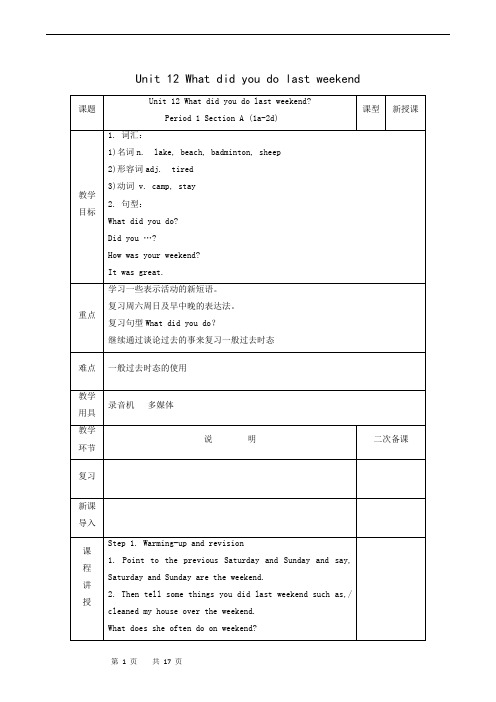
仿造对话,学会运用
1.学生两人一组仿照3a的对话。
2.请几组学生在全班交流,师生共同评价。
Step 3 Work on 3b
运用语法规律完成练习
1.学生四人一组试读短文,确定短文时态。
2.全班交流,教师通过追问“why?”,培养学生联系上下文整体理解的阅读策略。
T: Let’s play a game.
1.老师先在黑板上画自己周末做的事情,学生猜。(可使用图片或照片)
2.请一些学生到黑板上画自己的周末活动,其他学生猜。
更多练习,巩固加深
小结
作业布置
1. Remember the sentences in the Grammar Focus.
2. Think of six interesting things you did in the last month. Then write them down in English.
She is a little tired.她有点累了。
小结
作业布置
1. 复习一般过去式的构成方式,并总结其变化规律。
2. 回顾所学的周末/业余活动的词组;并用它们来造几个句子。
板书设计
课后反思
Unit 12 What did you do last weekend
课题
Unit 12 What did you do last weekend?
Where are your sheep, Ted?
Every sheep has a thick woolly coat.
每只羊身上都穿着一件厚的羊毛外套。
2. I worked as a guide at the Natural History Museum.
人教版七年级下英语第十一及十二单元知识点及练习

人教版七年级下英语第十一及十二单元知识点及练习Unit11 How was your school trip?重点单词feed v.feed the horse/dog *Don’t feed meet to the tiger.farm n. on the farmEg.There are lots of animals on the farm.v. People are farming in the fields.grow v. *plantgrow flowers/rice/watermelonsThe flower grows well.pick v.pick flowers/apples/strawberriestake v. bringCan we take some flowers to the party?yesterday n. yesterday’s… last night the day before yesterday Yesterday we had a good trip.worry v. Don’t worry.I worry I can’t pass the test. Don’t worry about me.anything somethingIs there anything in the box? I didn’t see anything in the box.fast adv. run/drive fast adj. a fast train/walkerway n.Along the way we saw many interesting things.*Which is the way to …?exciting adj. exciting news/trip excited adv. We were excited.hear v. *listen hear I can’t hear you.重点词组go for a walk/have a walk/take a walkEg. They often go for a walk by the river.quite(=very) a lot *quite coldI learnt quite a lot in this way.Show…aroundPlease show me around Beijing.go fishingcome outThe rain stopped.And the sun came out. All the flowers came out.go on a trip = go to …for a trip have/take a tripThey went on a trip in America last week.all in allAll in all,it’s a good place to have a trip.be interested inI’m interested in fishing/the movie/book.not…at allI don’t like the book at all. She doesn’t enjoy the trip at all.重点句式Then the guide taught us how to make a model robot.(1)teach sb. sth. / teach sth. to sb. teach me English/teach English to me(2)teach sb. (how) to do My mom taught me how to cook.一般过去时一、用法(1)在过去某个时间发生的动作或是存在的状态。
最全面人教版七年级下册英语第十二单元知识点归纳总结
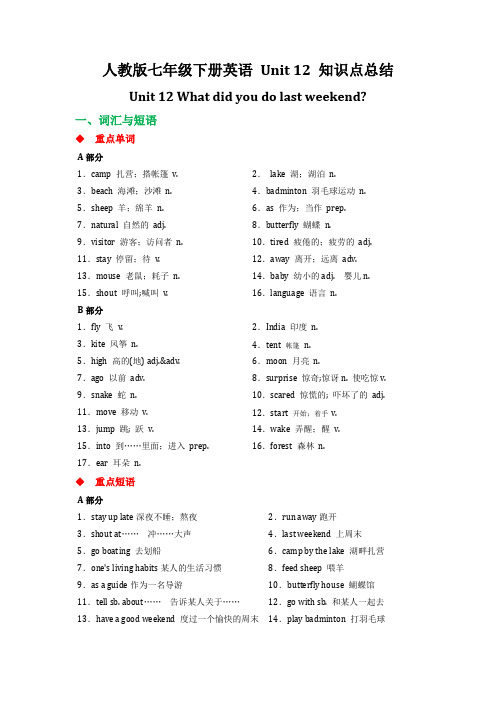
人教版七年级下册英语Unit 12 知识点总结Unit 12 What did you do last weekend? 一、词汇与短语◆重点单词A部分1.camp 扎营;搭帐篷v.2.lake 湖;湖泊n.3.beach 海滩;沙滩n.4.badminton 羽毛球运动n. 5.sheep 羊;绵羊n.6.as 作为;当作prep. 7.natural 自然的adj.8.butterfly 蝴蝶n.9.visitor 游客;访问者n.10.tired 疲倦的;疲劳的adj. 11.stay 停留;待v.12.away 离开;远离adv. 13.mouse 老鼠;耗子n.14.baby 幼小的adj. 婴儿n. 15.shout 呼叫;喊叫v.16.language 语言n.B部分1.fly 飞v.2.India 印度n.3.kite 风筝n.4.tent 帐篷n.5.high 高的(地) adj.&adv.6.moon 月亮n.7.ago 以前adv.8.surprise 惊奇;惊讶n. 使吃惊v. 9.snake 蛇n.10.scared 惊慌的; 吓坏了的adj. 11.move 移动v.12.start 开始;着手v.13.jump 跳; 跃v.14.wake 弄醒;醒v.15.into 到……里面;进入prep.16.forest 森林n.17.ear 耳朵n.◆重点短语A部分1.stay up late深夜不睡;熬夜2.run away跑开3.shout at……冲……大声4.last weekend 上周末5.go boating 去划船6.camp by the lake 湖畔扎营7.one's living habits某人的生活习惯8.feed sheep 喂羊9.as a guide作为一名导游10.butterfly house 蝴蝶馆11.tell sb. about……告诉某人关于……12.go with sb. 和某人一起去13.have a good weekend 度过一个愉快的周末14.play badminton 打羽毛球B部分1.fly a kite 放风筝2.high school 中学3.put up 搭起;举起4.each other 互相;彼此5.get a surprise 吃惊6.shout to……对……大声喊叫7.up and down 上上下下;起伏8.wake……up 把……弄醒9.a special gift 一件特殊的礼物10.take a long bus ride to 乘长途车去11.put up 搭起;举起12.keep sb. warm 使某人暖和13.on the first night 在第一个夜晚14.tell a story 讲故事15.go to sleep 入睡,睡着16.look out of 朝外看17.read a book about…读关于…的书18.know about 知道关于19.start to do sth. 开始做某事20.jump up and down 跳上跳下21.move into 搬进22.make a fire 生火23.something interesting 有趣的事情24.feel……doing sth. 觉得……正在做某事25.finish high school 高中毕业26.see……doing sth. 看见……正在做某事27.clean one's room 打扫房间28.so……that……如此……以至于……29.on Saturday night 在周六晚上30.have dinner with sb.和某人一起吃晚饭31.stay at home 待在家里32.have a busy weekend度过一个繁忙的周末33.talk show 脱口秀34.study for……为……学习◆重点句子A部分1.—What did you do last weekend? 上个周末你做什么了?—I did my homework. 我做我的家庭作业了。
人教版七年级下册第十二单元词组、句型及重难点解析课件(共33张)
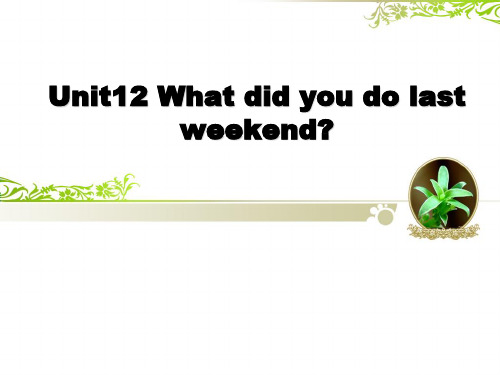
二、句子总结
• 1. go + doing 去做某事 2. play + 球类 玩……球 3. 时间段+ ago ……前 4. keep + sb. / sth. + 形容词 / 副词 / 介 词短语 使……保持……
二、句子总结
• 5. so + 形容词 / 副词+ that 句子 如 此……以至于…… 6. see sb. doing sth. 看见某人正在做某事 7. let sb. do sth. 让某人做某事
• 8.two weeks ago 两星期前,一段时间 + ago意为 “多长时间之前”,是表达过去的时间。它常与一般 过去时态连用。
• 三天前,我们参观了自然历史博物馆。
•
We visited the Natural History Museum
• three days ago.
三、重难点解析
• 【辨析】before 意为“在……之前”, • 其后可以跟一个时间的点;表示“在某 个
your health. • 咱们别睡觉,迎接新年的到来吧。 • Let’s stay up to see the New Year.
三、重难点解析
• 5.mouse 意为“老鼠”,复数形式为“mice”。
• 他们看到了两只老鼠。
• They saw two mice.
• nguage 意为“语言”,是可数名词。
to …则表示“带领某人去某处”。例如:
• On Sundays, the father would take his son
to the park.
• 一到星期天,爸爸便会带他的儿子去公园。
考点讲解:
七年级下册英语人教版第十二单元单词
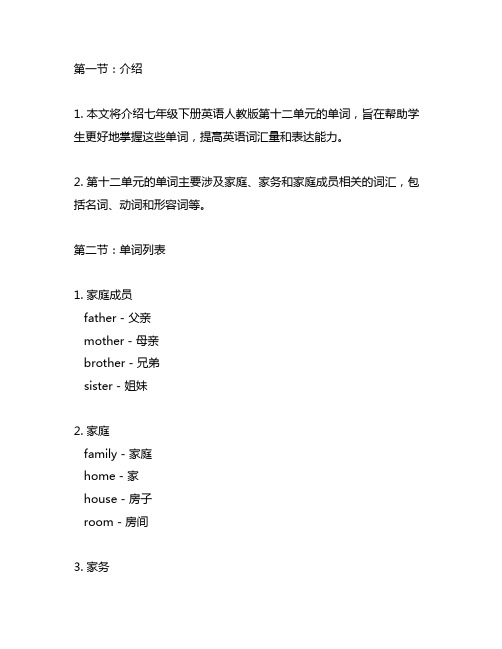
第一节:介绍1. 本文将介绍七年级下册英语人教版第十二单元的单词,旨在帮助学生更好地掌握这些单词,提高英语词汇量和表达能力。
2. 第十二单元的单词主要涉及家庭、家务和家庭成员相关的词汇,包括名词、动词和形容词等。
第二节:单词列表1. 家庭成员father - 父亲mother - 母亲brother - 兄弟sister - 姐妹2. 家庭family - 家庭home - 家house - 房子room - 房间3. 家务clean - 打扫tidy - 整洁的cook - 做饭wash - 洗4. 形容词big - 大的small - 小的fortable - 舒适的nice - 漂亮的第三节:单词用法和例句1. 家庭成员- My father is a doctor.(我的父亲是一名医生。
)- I have a younger sister.(我有一个妹妹。
)2. 家庭- This is my family photo.(这是我的家庭照片。
)- I love my home.(我爱我的家。
)3. 家务- I help my mom clean the house.(我帮妈妈打扫房子。
)- She can cook delicious food.(她会做好吃的菜。
)4. 形容词- Our house is big and beautiful.(我们的房子又大又漂亮。
)- The room is very small but cozy.(这个房间很小,但很舒适。
)第四节:单词学习方法1. 词义理解对于每个单词,要理解其基本的词义和用法。
可以通过查字典、阅读相关句子和段落来巩固理解。
2. 词语搭配部分单词需要与其他词语搭配使用,例如“clean the room”、“cook dinner”,要注意这些搭配的常用表达方式,用于日常交流中。
3. 句子造句单词不仅是独立存在的,更多时候是出现在句子中的。
【精选】人教版七年级下册英语Unit12第十二单元优秀教案

Unit 12 What did you do last weekend?第一课时Section A (1a1c)【学习目标】1.重点单词:camp, lake, beach, badminton2.重点短语:on Saturday morning,camp by the lake,go boating, go to the beach, play badminton3.重点句式:—What did you do last weekend, Lucy?—Well, on Saturday morning, I played badminton.【学习重点】掌握一般过去时态的特殊疑问句【学习难点】掌握一般过去时态的特殊疑问句【自主学习】一、预习课本P67新单词并识记,完成下面的汉译英。
1.扎营________ 2.湖泊________3.海滩________ 4.羽毛球运动________二、认真预习1a,1b,1c,找出下列短语和句型。
1.在星期六的早上2.在湖边宿营3.去划船4.去海滩5.打羽毛球6. Lucy,你上周末做什么了?在周六的早上,我打羽毛球了。
【课堂导学】Step 1情景导入Teacher: How was your last weekend?Student 1: It was very good.Teacher: What did you do last weekend?Student 1: I milked the cows.Teacher: What did you do last weekend?Student 2: I visited my grandmother. …环节说明:由师生问答的形式直接引出本节课要学的语言目标——一般过去时态,简单明了,直奔主题。
Step 2完成教材1a1c的任务1.教师领读1a中的单词或词组,学生跟读并且识记,然后两人一组互相提问。
人教版新目标七年级英语下册第七---第十二单元词汇用法汇总
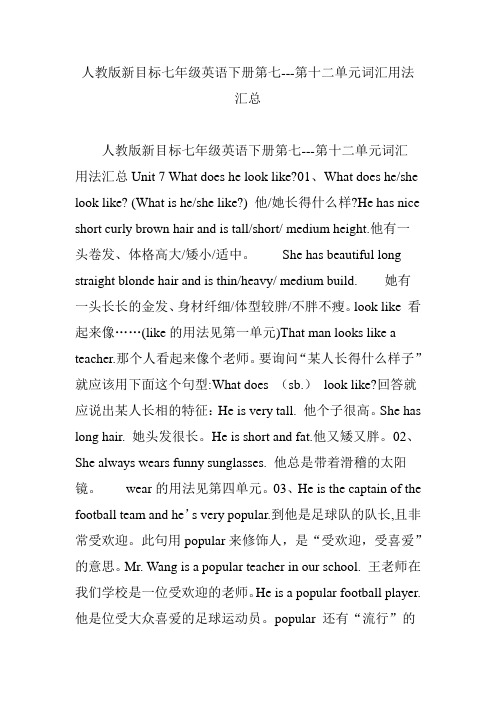
人教版新目标七年级英语下册第七---第十二单元词汇用法汇总人教版新目标七年级英语下册第七---第十二单元词汇用法汇总Unit 7 What does he look like?01、What does he/she look like? (What is he/she like?) 他/她长得什么样?He has nice short curly brown hair and is tall/short/ medium height.他有一头卷发、体格高大/矮小/适中。
She has beautiful long straight blonde hair and is thin/heavy/ medium build. 她有一头长长的金发、身材纤细/体型较胖/不胖不瘦。
look like 看起来像……(like的用法见第一单元)That man looks like a teacher.那个人看起来像个老师。
要询问“某人长得什么样子”就应该用下面这个句型:What does (sb.)look like?回答就应说出某人长相的特征:He is very tall. 他个子很高。
She has long hair. 她头发很长。
He is short and fat.他又矮又胖。
02、She always wears funny sunglasses. 他总是带着滑稽的太阳镜。
wear的用法见第四单元。
03、He is the captain of the football team and he’s very popular.到他是足球队的队长,且非常受欢迎。
此句用popular来修饰人,是“受欢迎,受喜爱”的意思。
Mr. Wang is a popular teacher in our school. 王老师在我们学校是一位受欢迎的老师。
He is a popular football player. 他是位受大众喜爱的足球运动员。
2019-2020年人教版英语七年级下册Unit-12-What did you do last w

( )1.A. summer B. month C. weekday D. weekends( )2.A. a lot B. a lots of C. a lot of D. lot of( )3.A. zoo B. park C. bank D. library( )4.A. tigers B. people C. friends D. animals( )5.A. dangerous B. friendly C. interesting D. ugly( )6.A. houses B. buildings C. cages D. ponds(池塘)( )7.A. angry B. happy C. friendly D. boring( )8.A. looking B. seeing C. watching D. hearing( )9.A. in B. at C. with D. on( )10.A. friendly B. interesting C. warm D. coldⅥ.阅读理解(共15小题,每小题2分,共30分)AJim is an English boy. He comes to China with his father and mother.They comehere to work. Jim comes here to study. He is in No. 15 Middle School. He gets up early every day. He is never late for school. He studies hard.He can read and write English well. He often helps us with our English, and we often help him with his Chinese. After class, he li kes playing football, swimming,running, jumping and riding. He makes many friends here. We’re very glad tostay with him. On Sundays, he often helps his mother clean the house, mendsomething or do the shopping. He likes Chinese food very much.He likes living here. He likes the Chinese students very much. We all like him, too.阅读短文,判断正(T)误(F)。
人教版七年级下册第十二单元知识点

Unit 12What did you do last weekend? 重点单词camp v. 扎营;扎帐篷lake n. 湖;湖泊beach n. 海滩;沙滩sheep n. 羊;绵羊as adv. & pron. 作为;当做natural pron. 自然的visitor n. 游客;访问者tired adj. 疲倦的stay v. 停留away adv. 离开mouse n. 老鼠baby n. 幼小的shout v. 呼叫;喊叫language n. 语言fly v. 飞kite n. 风筝high adj. & adv. 高的(地)ago adv. 以前India n. 印度moon n. 月亮surprise n. & v. 惊奇;惊讶snake n. 蛇move v. 移动start v. 开始;着手jump v. 跳跃wake v. 弄醒;醒into prep. 到……里面forest n. 森林ear n. 耳朵重点短语stay up late 熬夜;睡得很晚run away 跑开shout at…冲……大声叫嚷fly a kite 放风筝high school 中学put up 搭起,举起get a surprise 吃惊shout to…对……大声喊叫up and down 上上下下wake…up 把……弄醒重点句型1. How interesting!多么有趣啊!这是个感叹句。
感叹句结构是“How+形容词或副词+感叹号(!)”,表示“多么……!”。
例如:Look at that bird.How beautiful!瞧那只鸟,多么漂亮呀!2. Well,son,that’s why it’s important to learn a second language.所以嘛,儿子,这就是为什么学习外语重要啦。
…it was important not to go near a snake.……重要的是不要靠近蛇。
- 1、下载文档前请自行甄别文档内容的完整性,平台不提供额外的编辑、内容补充、找答案等附加服务。
- 2、"仅部分预览"的文档,不可在线预览部分如存在完整性等问题,可反馈申请退款(可完整预览的文档不适用该条件!)。
- 3、如文档侵犯您的权益,请联系客服反馈,我们会尽快为您处理(人工客服工作时间:9:00-18:30)。
Unit 12What did you do last weekend? 重点单词
camp v. 扎营;扎帐篷
lake n. 湖;湖泊
beach n. 海滩;沙滩
sheep n. 羊;绵羊
as adv. & pron. 作为;当做
natural pron. 自然的
visitor n. 游客;访问者
tired adj. 疲倦的
stay v. 停留
away adv. 离开
mouse n. 老鼠
baby n. 幼小的
shout v. 呼叫;喊叫
language n. 语言
fly v. 飞
kite n. 风筝
high adj. & adv. 高的(地)
ago adv. 以前
India n. 印度
moon n. 月亮
surprise n. & v. 惊奇;惊讶
snake n. 蛇
move v. 移动
start v. 开始;着手
jump v. 跳跃
wake v. 弄醒;醒
into prep. 到……里面
forest n. 森林
ear n. 耳朵
重点短语
stay up late 熬夜;睡得很晚
run away 跑开
shout at…冲……大声叫嚷
fly a kite 放风筝
high school 中学
put up 搭起,举起
get a surprise 吃惊
shout to…对……大声喊叫
up and down 上上下下
wake…up 把……弄醒
重点句型
1. How interesting!多么有趣啊!
这是个感叹句。
感叹句结构是“How+形容词或副词+感叹号(!)”,表示“多么……!”。
例如:
Look at that bird.How beautiful!瞧那只鸟,多么漂亮呀!
2. Well,son,that’s why it’s important to learn a second language.所以嘛,儿子,这就是为
什么学习外语重要啦。
…it was important not to go near a snake.……重要的是不要靠近蛇。
It is+形容词+to do sth.是英语中一个重要的形容词句型,十分常见。
能够这样用的形容词除important外,我们学过的还有easy,difficult等,表示“做某事是重要的、容易的、困难的”等等。
例如:
It’s difficult for me to study math.对我来说,学习数学好难啊。
3. But I was so tired that I went to sleep early.但是我太累了,所以早早就睡着了。
I was so scared that I couldn’t move.我是那么害怕,一动都不敢动。
英语中“so+形容词+that句子”,表示“太……以至于……”。
例如:
The soup was so delicious that he drank it up.汤是那么好喝,于是他喝了个精光。
重点语法
一般过去时
What提问
Who提问。
